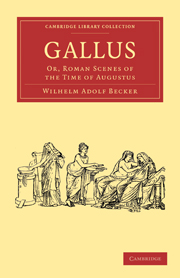Book contents
- Frontmatter
- Translator's Preface
- Author's Preface
- Contents
- ERRATUM
- SCENE THE FIRST THE NOCTURNAL RETURN HOME
- SCENE THE SECOND THE MORNING
- SCENE THE THIRD STUDIES AND LETTERS
- SCENE THE FOURTH THE JOURNEY
- SCENE THE FIFTH THE VILLA
- SCENE THE SIXTH LYCORIS
- SCENE THE SEVENTH A DAY AT BAIÆ
- SCENE THE EIGHTH THE DISPLEASURE OF AUGUSTUS
- SCENE THE NINTH THE BANQUET
- SCENE THE TENTH THE DRINKERS
- SCENE THE ELEVENTH THE CATASTROPHE
- SCENE THE TWELFTH THE GRAVE
- APPENDIX
- Excursus I Roman Marriage
- Excursus II Education
- Excursus I The Roman House
- Excursus II The Slave Family
- Excursus I The Library
- Excursus II The Books
- Excursus III The Booksellers
- Excursus IV The Letter
- Excursus V The Clocks and Divisions of Time
- Excursus I The Lectica and the Carriages
- Excursus II The Inns
- Excursus I The Game of Ball, and other Gymnastic Exercises
- Excursus II The Gardens
- Excursus: The Dress of the Women
- Excursus: The Baths
- Excursus: The Male Attire
- Excursus I The Meals
- Excursus II The Triclinium
- Excursus III The Table Utensils
- Excursus IV The Drinks
- Excursus I The Manner of Lighting
- Excursus II The Garlands
- Excursus III The Social Games
- Excursus: The Manner of Closing the Doors
- Excursus: The Interment of the Dead
- Index
Excursus I - The Game of Ball, and other Gymnastic Exercises
Published online by Cambridge University Press: 10 November 2010
- Frontmatter
- Translator's Preface
- Author's Preface
- Contents
- ERRATUM
- SCENE THE FIRST THE NOCTURNAL RETURN HOME
- SCENE THE SECOND THE MORNING
- SCENE THE THIRD STUDIES AND LETTERS
- SCENE THE FOURTH THE JOURNEY
- SCENE THE FIFTH THE VILLA
- SCENE THE SIXTH LYCORIS
- SCENE THE SEVENTH A DAY AT BAIÆ
- SCENE THE EIGHTH THE DISPLEASURE OF AUGUSTUS
- SCENE THE NINTH THE BANQUET
- SCENE THE TENTH THE DRINKERS
- SCENE THE ELEVENTH THE CATASTROPHE
- SCENE THE TWELFTH THE GRAVE
- APPENDIX
- Excursus I Roman Marriage
- Excursus II Education
- Excursus I The Roman House
- Excursus II The Slave Family
- Excursus I The Library
- Excursus II The Books
- Excursus III The Booksellers
- Excursus IV The Letter
- Excursus V The Clocks and Divisions of Time
- Excursus I The Lectica and the Carriages
- Excursus II The Inns
- Excursus I The Game of Ball, and other Gymnastic Exercises
- Excursus II The Gardens
- Excursus: The Dress of the Women
- Excursus: The Baths
- Excursus: The Male Attire
- Excursus I The Meals
- Excursus II The Triclinium
- Excursus III The Table Utensils
- Excursus IV The Drinks
- Excursus I The Manner of Lighting
- Excursus II The Garlands
- Excursus III The Social Games
- Excursus: The Manner of Closing the Doors
- Excursus: The Interment of the Dead
- Index
Summary
THE daily bath, and previous to it strong exercise, for the purpose of causing perspiration, were inseparable, in the minds of the Romans, from the idea of a regular and healthy mode of life. They had a multitude of exercises, more or less severe, which were regularly gone through every day before the bath, thus rendering the body strong and active, and exciting a greater appetite for the meal that was to follow.
Of course these exercises were confined to the male sex, as gymnastics were considered unbecoming and indecent for women, (Mart. vii. 67, 4; Juven. vi. 246, 419), and in Greece the Spartan unfeminineness (libidinosœ Lacedœmonis palœstrœ, Mart. iv. 55, 6), afforded great cause for ridicule. See Aristoph. Lysistr. 81; although Propert. iii. 14, and Ovid, Her. xvi. 149, for reasons easily understood, dwell with pleasure on this virginea palœstra.
These antique gymnastics, or rather those of the Romans, which will alone form the subject of our present inquiry, differed in many respects from those of modern times, in which they are confined to the period of youth. In Rome, on the contrary, there was not the slightest idea of impropriety when the consul, or triumphator, the world-ruling Cæsar himself, sought in the game of ball, or other kind of gymnastics, a wholesome exertion for both body and mind; and they who omitted such exercises were accused of indolence.
- Type
- Chapter
- Information
- GallusOr, Roman Scenes of the Time of Augustus, pp. 274 - 283Publisher: Cambridge University PressPrint publication year: 2010First published in: 1844



